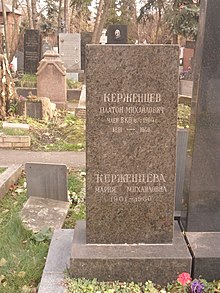Platon Kerzhentsev
From 29 December 1930 until 23 March 1933, he served as Administrator of Affairs of the Council of People's Commissars, and was the second person to fill that post.
[5] Returning to Russia in 1917, he was a leading figure in the Proletkult movement, and was the director of ROSTA, forerunner of the TASS news agency.
In 1921, when Proletkult was taken under party control, on Lenin's instructions, and its founder, Alexander Bogdanov was ousted, Kerzhentsev was appointed Ambassador in Sweden.
He returned in 1923, and criticised Bogdanov in Pravda where he focused on The Organizational Principles of a Uniform Economic Plan a text submitted to the First Conference on Scientific Organization of Labour (January 1921).
He then wrote an article that appeared in Pravda on 7 February 1929, alleging that the Ukrainian people were being insulted by a play performed at the Moscow Arts Theatre, his obvious target being Bulgakov's first and best known play, The Day of the Turbins known to western audiences as The White Guard, set in Kiev, and attacked the People's Commissar for Enlightenment, Anatoli Lunacharsky for allowing it to be staged.
In January 1936, he was appointed Chairman of the State Committee on the Arts, which meant that he was responsible for theatre, opera and music, as well as other art forms, during the campaign initiated by Stalin against Dmitri Shostakovich, who turned to Kerzhentsev for advice, and was told to write less complex music that the masses could understand.
